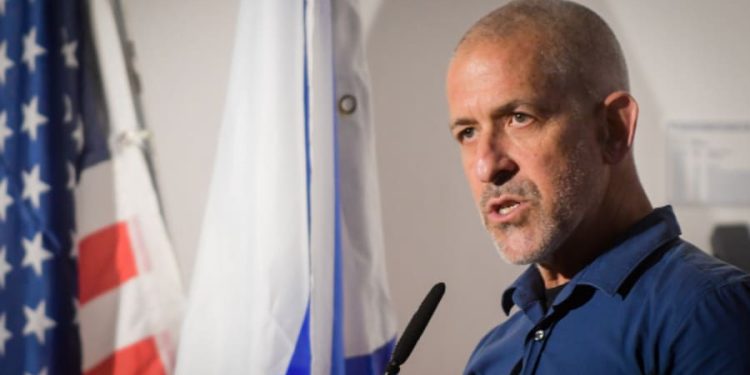Ronen Bar, head of the Shin Bet security agency, speaks during a conference at the Reichman University in Herzliya, September 11, 2022. (Photo: Avshalom Sassoni/Flash90)
Hamas on Sunday said that it would not accept the latest “bridging proposal” from the U.S. which has been the basis of recent discussions over a hostage deal with Israel in Doha, Qatar, and Cairo, Egypt.
The terror group released a statement saying, “The Hamas negotiating delegation left Cairo this evening, after meeting with the mediating brothers in Egypt and Qatar, and listening to the results of the last round of negotiations.”
Hamas said that it is willing to accept the previous proposal, put forward by U.S. President Biden in July.
“The Hamas delegation demanded that the occupation be bound by what was agreed upon on 2 July, based on what was stated in Biden’s speech and the Security Council resolution.”
Hamas insisted “that any agreement must include a permanent ceasefire, a complete withdrawal from the Gaza Strip, the freedom of return of residents to their areas, relief and reconstruction, and a serious exchange deal.”
The announcement came after the return of the Israeli delegation, consisting of Mossad head David Barnea, Shin Bet chief Ronen Bar, and the head of the IDF’s Hostages and Missing Persons unit, Maj. Gen. (res.) Nitzan Alon. Also present at the talks were CIA Director William Burns, Qatari Prime Minister Sheikh Mohammed bin Abdulrahman bin Jassim Al Thani, and the head of Egyptian intelligence Abbas Kamel.
The Israeli delegation is expected to brief Prime Minister Benjamin Netanyahu on the progress of the talks Monday.
A source with connections to the Egyptian intelligence told N12 News that Hamas knows where all the hostages are being held, contradicting a previous statement from the terror group stating it did not know where all the hostages are, or exactly how many are still alive.
The source said that Hamas’ biggest concern is the Philadelphi Corridor, which Israel seized control of during its initial operation in Rafah.
The terror group operated as series of smuggling tunnels in that area, which it used to bring in weapons and supplies. One of the tunnels was large enough for full-size delivery trucks to drive through.
During the recent negotiations, the Israeli delegation attempted to reach agreements with the Egyptians on the Philadelphi Corridor and the Rafah crossing.
Saudi news channel Al-Sharq Al-Awsat, citing sources close to the negotiations, reported that Israel demanded that eight military points along the Philadelphi Corridor currently manned by IDF remain during the first phase of the hostage deal. The sources said that during the negotiations, the Israeli delegation agreed to reduce their number to five points.
Meanwhile, U.S. National Security Advisor Jake Sullivan stated that the United States was still “feverishly” working to achieve a hostage ceasefire deal.
A U.S. official told Times of Israel, “The process will continue over the coming days through working groups to further address remaining issues and details.”
The official said the recent talks were “constructive and were conducted in the spirit of reaching a final and implementable agreement with all sides share that sentiment.”





































